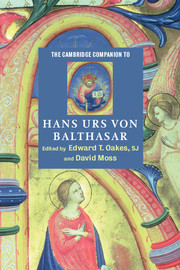18 - Balthasar and Karl Rahner
from Part IV - Contemporary encounters
Published online by Cambridge University Press: 28 May 2006
Summary
Karl Rahner and Hans Urs von Balthasar are the two most significant figures of twentieth-century Roman Catholic theology. They were, roughly speaking, contemporaries. Both joined the Jesuits, and at one time they were collaborators, but they followed different paths, working in different contexts (Rahner had a much more traditional life as a Jesuit and an academic theologian than did Balthasar), and, as we shall see, doing theology in rather different ways. It has become customary to see Rahner and Balthasar as representing two roads down which Roman Catholic theology can go. Each had periods in the ascendancy and periods when they were, one might say, in the doghouse, and it is probably still too soon to say which will be taken as the more important thinker in the long run.
An interesting question to ask is whether Rahner and Balthasar ought to be construed as fundamentally opposed – whether the two roads go in genuinely different directions – or whether instead they can be seen as developing complementary kinds of theology. The answer, it seems, depends very much on whom one asks: Balthasar scholars usually, but not necessarily always, think there is a clear and important opposition; Rahner scholars are more likely than not to opt for complementarity.
- Type
- Chapter
- Information
- The Cambridge Companion to Hans Urs von Balthasar , pp. 256 - 268Publisher: Cambridge University PressPrint publication year: 2004
- 12
- Cited by



